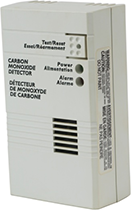Protect Yourself from Carbon Monoxide Poisoning
Source: www.cdc.com
In many parts of the country, this winter has brought heavy snow and ice—even to areas where winter storms are usually uncommon. Next up is spring, which brings its own turbulence.  When electrical outages occur during severe weather, many people use alternative sources of power for heating, cooling, or cooking. Portable generators, stoves, lanterns, gas ranges, even wood fires can cause carbon monoxide (CO) to build up in a home, garage, or camper and poison the people and animals inside.
When electrical outages occur during severe weather, many people use alternative sources of power for heating, cooling, or cooking. Portable generators, stoves, lanterns, gas ranges, even wood fires can cause carbon monoxide (CO) to build up in a home, garage, or camper and poison the people and animals inside.
At least 430 people die each year in the United States from unintentional, non-fire-related CO poisoning. But you can protect yourself and your family from CO poisoning by following safety tips and installing a CO detector in your home. If you don’t have a CO detector, why not get one now?
One way to remind yourself to change the batteries in your CO detector every six months is to do that during time change weekends.
